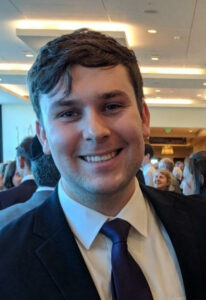Meet Michael King, Doctoral Student in the Developmental, Cognitive and Affective Sciences Psychology Program
 What is your research focus (as well as any academic or service focus)?
What is your research focus (as well as any academic or service focus)?
My research centers around the cognitive and perceptual factors that influence human performance, such as memory, attention, and learning. My current research is focused on visual search, and how attentional demands affect working memory capacity during search.
What are your goals for after grad school?
After grad school I hope to be working in an applied research field, whether that be in industry or in academia.
What advice would you give undergrads applying to grad school?
Start preparing your materials early, and be extremely organized! Also, don’t be shy to ask grad students in the department for help and advice.
Meet Silvia Rodriguez, Doctoral Student in the Clinical Psychology Program
 What is your research focus (as well as any academic or service focus)?
What is your research focus (as well as any academic or service focus)?
My research focuses on risk factors associated with suicide, particularly among older adults. I’m interested in understanding what cognitive factors contribute to suicidal ideation, how and when ideation turns into suicidal acts, and which interventions are most effective for older suicidal individuals. Outside of research, I focus on graduate student wellness and enjoy planning wellness and social events for our department.
What are your goals for after grad school?
I hope to be a full-time practicing clinical psychologist as well as offer pro bono therapy for individuals in need and consultation services for religious institutions that might otherwise overlook psychological services.
What advice would you give undergrads applying to grad school?
My biggest advice is to be true to yourself. Apply to programs that fit your interests and career goals and pay attention to how the potential advisor fits with your personality and work style. Also, don’t limit yourself geographically (if you’re able). People had many things to say about my move from Los Angeles to Cleveland. It turns out I love living in Cleveland!
Meet Nora Hassan, Masters Student in the Communication Sciences Program
 Can you tell me about your meta-analysis project?
Can you tell me about your meta-analysis project?
I researched the impact of oral motor interventions (non-nutritive sucking and oral stimulation) on the feeding performance of premature infants in the neonatal intensive care unit (NICU). With an increase in the population of premature infants, there is an increased need to facilitate the development of oral feeding skills, and speech language pathologists who work in the NICU play an important role in this. After analyzing ten studies that implemented oral motor interventions and calculating an overall effect size, it was determined that oral motor interventions decrease the time required for premature infants to begin to fully orally feed and decrease the length of hospital stay. There are numerous clinical implications of these findings, including decreasing medical costs and increasing the time and bond between caregivers and infants.
What are your goals for after grad school?
After graduate school, I hope to work with infants, children, and adolescents with a variety of needs. I am excited to provide speech, language, and feeding services to children and to work with families of diverse backgrounds. I hope to collaborate with speech-language pathologists and other professionals as part of a multidisciplinary team, in order to determine and implement the best services for each child and continue to learn and grow as a clinician.
What advice would you give undergrads applying to grad school?
My advice to undergrads applying to grad school is to explore what you are passionate about and allow your application to reflect these passions. Explore the research and observe professionals to gain experience outside of the classroom and discover your clinical interests. Search for programs that are the best fit for you and individualize your applications to each of these programs.
